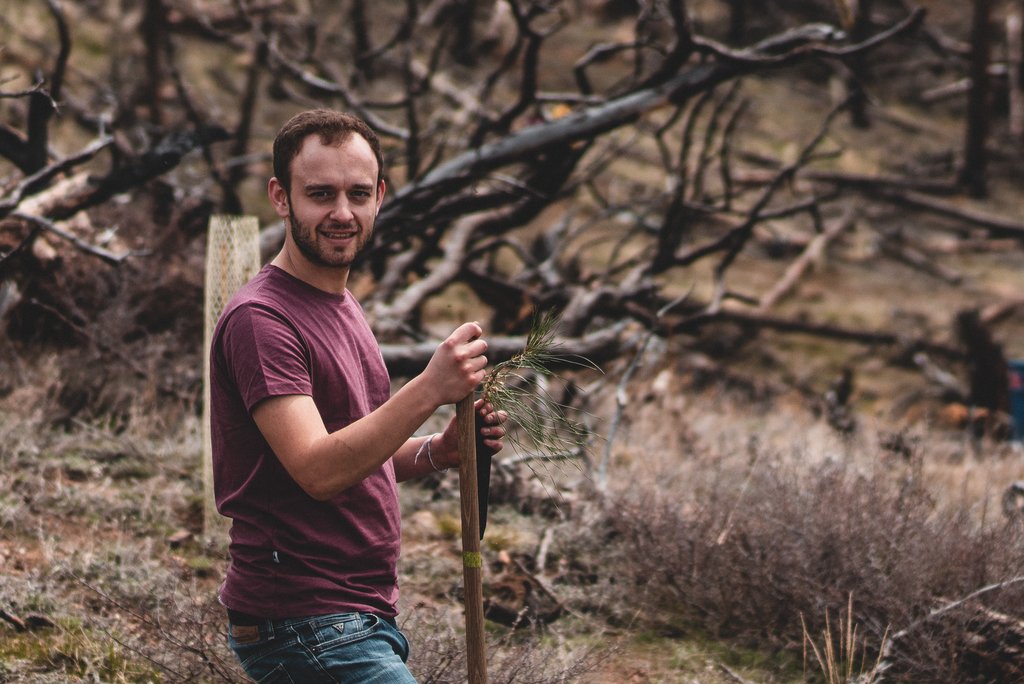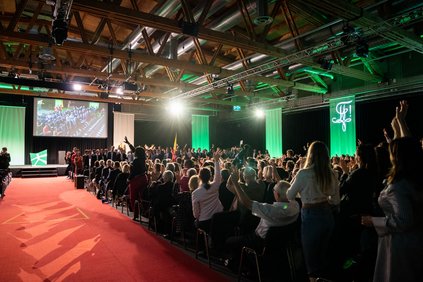Campus - 16.06.2023 - 13:42
A tree planted for every product sold: Fashion start-up by University of St.Gallen (HSG) graduates focuses on sustainability
The start-up Nikin wants to work as sustainably as possible – although that isn't easy in the fashion industry, as co-founder and HSG graduate Nicholas Hänny says. He and Robin Gnehm founded Nikin in 2016 with 5,000 Swiss francs in starting capital. The start-up now plans to grow in Europe too.

Nicholas Hänny likes trees: His fashion start-up Nikin has planted over two million of them all over the world so far – one for every garment sold. He is also currently hugging a tree closely on an advertising poster that can be seen throughout Switzerland. The poster is designed as a meme and portrays Hänny self-ironically. But his love of nature is genuine, as he emphasizes. “My co-founder Robin Gnehm and I were both scouts for many years. That shaped our relationship to forests and nature early on.” And because Hänny once sold several hundred gym bags he designed himself as an HSG bachelor’s student, it was clear that Nikin wanted to work with textiles.
The two now 31-year-olds founded Nikin in 2016 with a mere 5,000 Swiss francs in starting capital. “Back then, people tended to laugh at sustainability in the fashion industry. In addition, many tried to dissuade me and said I should first look for a ‘proper’ job”, Hänny remembers, who completed a CEMS Master in International Management at HSG in 2018.
Small shareholders instead of major investors
The start-up now has around 50 employees and broke through the boundary of 10 million Swiss francs in turnover for the first time in 2020 with its sustainable clothes and accessories. The advancement with little use of funds was made possible with targeted marketing on social media. “This made us visible to the right people and, with the first revenue, we were able to finance new advertising again”, says Hänny.
Nikin used external funds – a loan from Aargau Cantonal Bank – for the first time in 2021. At the end of 2022, the start-up then performed crowdinvesting and now has a total of over 4,000 small shareholders. Using this approach, Nikin was able to increase the capital by five million.
The background to the campaign: Nikin wants to grow and tap into the rest of Europe in addition to the core markets of Switzerland and Germany. “Of course, we want to work profitably, but at the same time, we are not purely profit-oriented, but rather our vision is sustainability, which we want to pursue for the long term. This community that supports us suits us better than classic investors”, says Hänny.
Compostable t-shirt launched
Nikin’s history is shaped by a procedure that is often unconventional. “We entered the fashion industry as complete novices”, Hänny says. They learnt a lot of things during the work itself – “and we saw quickly that efforts at various levels are required for genuine sustainability in the fashion industry”. From 2018, the founders therefore committed themselves to their company full-time.
Nikin plants trees, among others, produces its products almost exclusively in Europe, has its cotton certified by the Global Organic Textile Standard (GOTS), donates or recycles unsold clothes, has renounced plastic from the beginning, is vegan and experiments with sustainable fabrics. For example, Nikin uses the sustainable synthetic fibre Polylana as an alternative to acrylic and recently launched a 100 per cent compostable t-shirt made from the material naNea by the Swiss start-up OceanSafe.
Nevertheless, Hänny says: “Among fashion start-up founders, it is also disputed as to whether the fashion industry can really be sustainable at all. In any case, we want to continue to improve in this field.” In the next five to ten years, he expects a breakthrough in the area of circular textiles – fabric that can be recycled infinitely, in theory. “When these become usable on an industrial scale, it will change the industry fundamentally.”
HSG culture provides motivation for founding companies
In addition to his work as the Nikin CEO, Hänny coaches other start-up founders – in around 100 free calls lasting 15 minutes annually. “Of course, I don’t know the answer to all the questions either, but many people just need some motivation or quick-to-implement tips to get started.” He senses great reluctance in Switzerland to try out one’s own ideas and also to dare to fail. “With my small contribution, I want to attempt to change this culture.”
He himself found the culture at HSG for founding companies motivational, among other things. “Even during my Bachelor’s degree, I already had fellow students who implemented small business ideas. This encouraged me to realize my vision too.” At HSG, he completed various courses on entrepreneurship, but he also describes the environment as formative: “There are an incredible number of student associations, and, for example, the founder conference START Summit and many other events at which networking with experienced entrepreneurs is possible.”
More articles from the same category
This could also be of interest to you
Discover our special topics
















